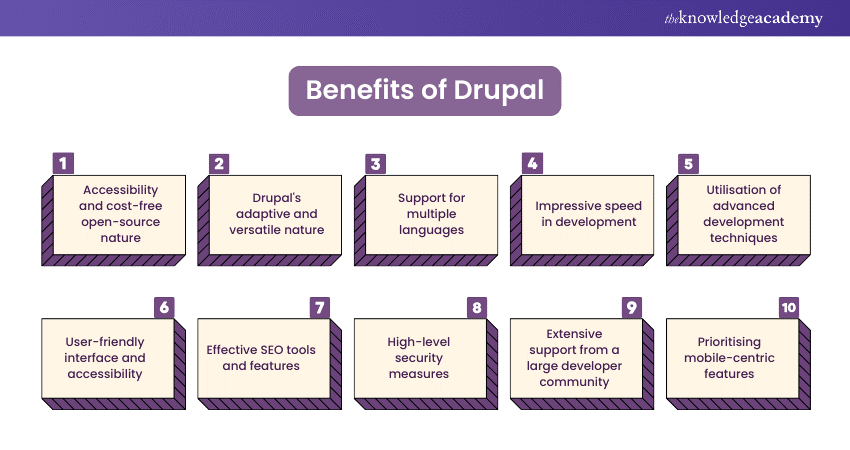We may not have the course you’re looking for. If you enquire or give us a call on 01344203999 and speak to our training experts, we may still be able to help with your training requirements.
We ensure quality, budget-alignment, and timely delivery by our expert instructors.

Drupal is a popular and powerful Content Management System (CMS) that can help you create and manage any type of website. It is open source, meaning you can download, use, and modify it for free. It also has a large and active community of developers, users, and supporters. These contributors constantly aid in its development and improvement. But what are the benefits of Drupal that attract so many professionals and enthusiasts to it?
If you are also wondering about it, this blog is for you. In this blog, we will give you a quick overview of the top 10 Benefits of Drupal and explain how they can enhance your online presence and business.
Table of Contents:
1) 10 Benefits of Drupal
a) Accessibility and cost-free open-source nature
b) Drupal's adaptive and versatile nature
c) Support for multiple languages
d) Impressive speed in development
e) Utilisation of advanced development techniques
f) User-friendly interface and accessibility
g) Effective SEO tools and features
h) High-level security measures
i) Extensive support from a large developer community
j) Prioritising mobile-centric features
2) Conclusion
10 Benefits of Drupal

Here is a list of the top Drupal benefits:
1) Accessibility and cost-free open-source nature
Drupal's commitment to accessibility and its cost-free open-source nature form the cornerstone of its appeal. Open source means anyone, anywhere, can access, use, and modify the platform without financial barriers. This inclusive approach fosters innovation, encourages collaboration, and empowers developers, startups, and enterprises to leverage Drupal Features for various web projects.
2) Drupal's adaptive and versatile nature
The adaptability and versatility of Drupal make it a preferred choice for a spectrum of web development needs. Its flexible architecture accommodates everything from small personal blogs to complex enterprise-level solutions. Developers benefit from a framework that adapts to different requirements, providing a versatile canvas for crafting diverse digital experiences. Additionally, understanding Drupal interview questions can further enhance your knowledge and preparation for working with this powerful platform.
3) Support for multiple languages
Drupal's multilingual capabilities break down language barriers, making it a go-to platform for global web development. Websites built on Drupal can seamlessly offer content in multiple languages, enhancing their reach and impact. This feature is invaluable for businesses, organisations, and content creators looking to connect with a diverse, international audience.
4) Impressive speed in development
Drupal's modular approach accelerates the web development process. Pre-built modules and themes allow developers to assemble and customise features rapidly. This efficiency in development speed saves time and enables quicker responses to market demands, ensuring timely delivery of web projects.
Are you interested in learning more about how to develop websites and apps? Register now for our App & Web Development Training!
5) Utilisation of advanced development techniques
Drupal empowers developers with advanced development techniques, facilitating the implementation of sophisticated functionalities. From creating custom content types to managing intricate data structures, Drupal provides the tools needed to execute complex web solutions, catering to the demands of modern, feature-rich websites.
6) User-friendly interface and accessibility
Drupal places a premium on user-friendliness, ensuring content creation and management are intuitive processes. The user-friendly interface allows technical and non-technical users to navigate the platform effortlessly, contributing to a website's content easily. This accessibility is crucial for fostering collaboration and encouraging a diverse range of contributors.
7) Effective SEO tools and features
Drupal stands out for its robust suite of SEO tools, offering website owners the means to enhance their online visibility. Features like customisable URLs, meta tags, and XML sitemaps contribute to effective search engine optimisation, ensuring that Drupal-powered websites are well-positioned for success in competitive online landscapes.
Enhance your knowledge of website development with our Drupal 7 Course – register now!
8) High-level security measures
Drupal's commitment to security is evident through its proactive approach to risk mitigation. Regular updates and a vigilant security team work to address vulnerabilities promptly, instilling confidence in users that their websites are safeguarded against potential threats. This focus on security is crucial for maintaining data integrity and user privacy.
9) Extensive support from a large developer community
The strength of Drupal lies not only in its features but also in the expansive community that surrounds it. A large and active developer community ensures a constant exchange of knowledge, support, and collaborative efforts. Developers benefit from shared expertise, contributed modules, and a collaborative environment that fosters continuous improvement, innovation, and the collective growth of the Drupal ecosystem.
10) Prioritising mobile-centric features
In response to the mobile-centric era, Drupal prioritises optimising websites for mobile devices. Responsive design and mobile optimisation are integral features, enabling Drupal-powered websites to deliver seamless user experiences across various devices, including smartphones and tablets. This focus on mobile-centric features aligns with the evolving preferences of users, ensuring that websites remain accessible and engaging in an increasingly mobile-driven landscape, a key area of comparison in WordPress vs Drupal, where both platforms offer mobile optimisation but with different approaches and capabilities.
Conclusion
In conclusion, the Benefits of Drupal extend far beyond its open-source foundation. Its adaptability, multilingual support, and mobile-centric features make it a top choice for web development. With robust security and a supportive developer community, Drupal stands tall, offering a comprehensive solution for creating powerful and dynamic websites.
Learn how to design websites effortlessly with our Website Design Course – sign up today!
Frequently Asked Questions
What is Drupal best used for?

Drupal is best used for creating dynamic and robust websites, especially those requiring advanced functionality and scalability. Its open-source nature and supportive community make it ideal for developers seeking flexibility and customisation. Drupal excels in handling complex content structures, multiple user roles, and diverse integrations, making it a preferred choice for businesses and organisations with intricate web development needs.
What is the functionality of Drupal?

Drupal serves as a robust and versatile Content Management System (CMS). Its functionality encompasses creating, managing, and organising digital content effortlessly. With features like a modular structure, extensive theming capabilities, and support for multiple languages, Drupal empowers users to design and customise websites efficiently. Its adaptability, user-friendly interface, and vast community of developers contribute to its status as a powerful and flexible platform for diverse web development needs.
What are the disadvantages of Drupal?

Despite its many advantages, Drupal does have some drawbacks. The platform can be complex for beginners, requiring a steeper learning curve. Customisation may demand advanced technical expertise, and the abundance of modules can lead to compatibility challenges during updates. Additionally, Drupal's resource-intensive nature may require substantial server resources. However, these disadvantages can be mitigated with proper knowledge and expertise, making Drupal a powerful and versatile CMS solution.
What are the other resources and offers provided by The Knowledge Academy?

The Knowledge Academy takes global learning to new heights, offering over 3,000 online courses across 490+ locations in 190+ countries. This expansive reach ensures accessibility and convenience for learners worldwide.
Alongside our diverse Online Course Catalogue, encompassing 19 major categories, we go the extra mile by providing a plethora of free educational Online Resources like News updates, Blogs, videos, webinars, and interview questions. Tailoring learning experiences further, professionals can maximise value with customisable Course Bundles of TKA.
What is Knowledge Pass, and how does it work?

The Knowledge Academy’s Knowledge Pass, a prepaid voucher, adds another layer of flexibility, allowing course bookings over a 12-month period. Join us on a journey where education knows no bounds.
What are related courses and blogs provided by The Knowledge Academy?

The Knowledge Academy offers various App & Web Development courses, including Mobile App Development Course, Drupal 7 Course, and UI UX Design Course. These courses cater to different skill levels, providing comprehensive insights into Web Development business methodologies.
Our App and Web Development blogs cover a range of topics related to PRINCE2, offering valuable resources, best practices, and industry insights. Whether you are a beginner or looking to advance your Project Management skills, The Knowledge Academy's diverse courses and informative blogs have you covered.
Upcoming Programming & DevOps Resources Batches & Dates
Date
 Drupal Course
Drupal Course
Fri 27th Jun 2025
Fri 29th Aug 2025
Fri 24th Oct 2025
Fri 5th Dec 2025






 Top Rated Course
Top Rated Course



 If you wish to make any changes to your course, please
If you wish to make any changes to your course, please


